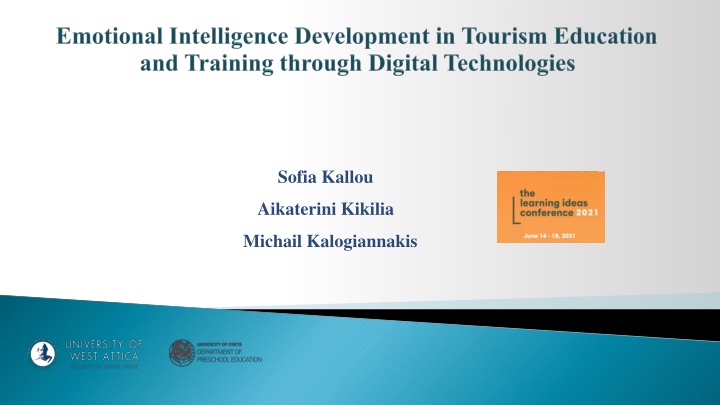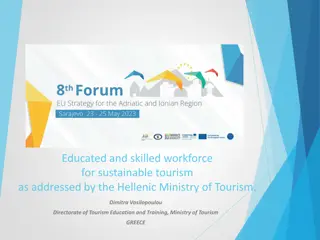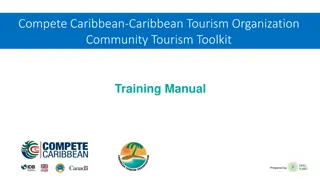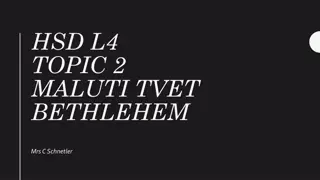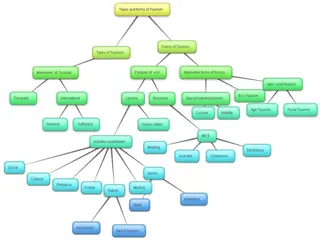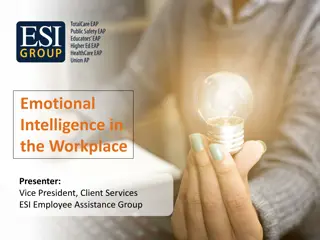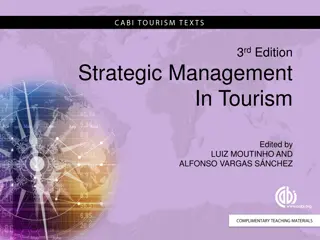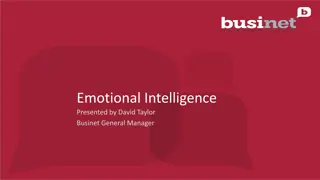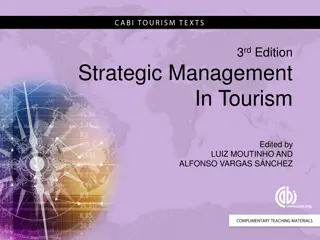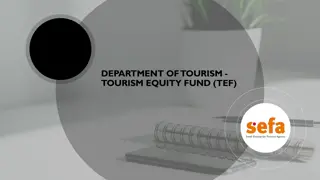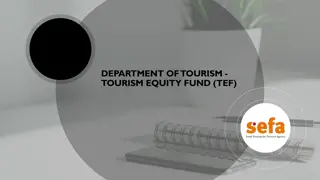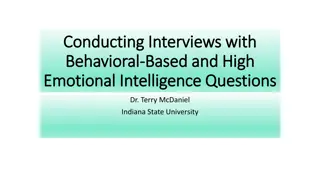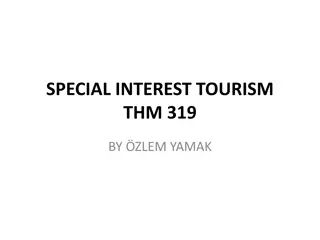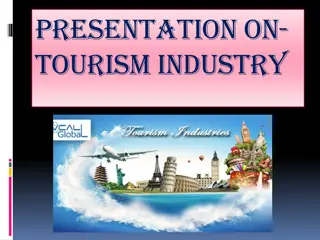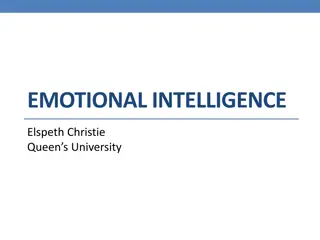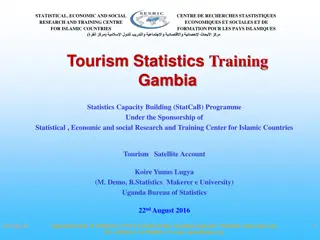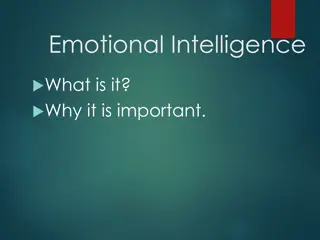Enhancing Tourism Education and Training through Emotional Intelligence and Digital Technologies
Discover the importance of Emotional Intelligence (EI) and Digital Technologies in the tourism industry, focusing on how EI can enhance customer satisfaction and the role of innovative teaching methods in developing soft skills for tourism sector students and employees. The ongoing evolution of tourism education due to radical changes brought by emerging technologies is also explored.
Download Presentation

Please find below an Image/Link to download the presentation.
The content on the website is provided AS IS for your information and personal use only. It may not be sold, licensed, or shared on other websites without obtaining consent from the author.If you encounter any issues during the download, it is possible that the publisher has removed the file from their server.
You are allowed to download the files provided on this website for personal or commercial use, subject to the condition that they are used lawfully. All files are the property of their respective owners.
The content on the website is provided AS IS for your information and personal use only. It may not be sold, licensed, or shared on other websites without obtaining consent from the author.
E N D
Presentation Transcript
Sofia Kallou Aikaterini Kikilia Michail Kalogiannakis
Rapid literature review analysis SWOC analysis of using Digital Technologies SWOC analysis of Emotional Intelligence Key points of EI development & DT Tourism education and training.
EI is the ability of a person to control and regulate his or her emotions and emotional reactions to himself and others, to be able to distinguish them and to use the information that emerges from them to guide his thinking and actions. (Salovey & Mayer, 1990) Self awarene ss EI Social awarene ss Self manage ment Relations hip managem ent
Tourism is an industry that focuses on people with visitors seeking experiences t is the communication between tourists and service employees that creates memorable experiences (Chang, 2014) Tourism employees make the difference to these visitors' experiences (Prentice, 2020) Service employees with a high level of EI can understand customers' thoughts and emotions and develop empathy resulting in customers satisfaction (Koc & Boz, 2019)
Tourism education and training are essential for developing human resources providing incentives and knowledge (Baum, 1995; Harris, 2000) In a world characterized by radical changes, tourism education did not involve and remained traditional A transformation that focuses on innovative teaching methods, curriculum and new learning environments is crucial for the evolution of tourism education and training Focusing on developing soft skills, critical thinking, communication skills, and teamwork will provide advantages to tourism sector students and employees (Simantaraki & Dimou, 2013; Hsu, 2018)
The ongoing rapid development of emerging technologies has brought about radical changes on education training goals, programs, methods, and corporate values (Jimogiannis, 2019; Holladay, 2017) LMS MOOCs Web Conference Technologies Gamification Mobile Learning Virtual Technologies (Sofos & Parashou, 2015)
In the tourism sector, research has shown that tourism students are enthusiastic about using online learning and enjoy the experience compared to the traditional classes (Annaraud & Singh, 2017). Additionally, some researchers have recognized the online learning as the future of hospitality and tourism education (Kim & Jeong, 2018).
The objective of conducting the SWOC analysis is to develop critical areas of focus for improving the Tourism Education and Training
STRENGTHS STRENGTHS WEAKNESSES WEAKNESSES -EI can be developed -EI is linked to performance, leadership, job satisfaction, relationships, reduced stress, flexibility, effective communication -Empathy leads to customer s satisfaction and loyalty -The training of educators is costly -EI takes time to develop Findings of Emotional Intelligence Development in Tourism Education and Training Findings of Emotional Intelligence Development in Tourism Education and Training OPPORTUNITIES -EI as a tool for improving performance and job satisfaction - Tourism organizations should offer emotional health services as a part of a benefits package OPPORTUNITIES CHALLENGES CHALLENGES -EI could be used to manipulate others -EI equates with more self control, yet extreme self control leads to low innovation and creativity levels
STRENGTHS STRENGTHS WEAKNESSES WEAKNESSES -Effectiveness-Performance -Flexibility- Autonomy -Reduced costs -Interaction -Commitment -Motivation, engagement -Open access platforms -Vast number of participants -Technical difficulties -Availability of the platforms -Not immediate feedback in asynchronous communication -Less physical interaction with the educators Findings of using Digital Technologies in Tourism Education and Training OPPORTUNITIES OPPORTUNITIES CHALLENGES CHALLENGES -Changes in knowledge & skills -Life long development -New teaching styles emphasizing in interaction & communication -Educators training - Creating online courses that encourage social presence -Emotional problems from isolation -Not well-trained educators for instruction remotely - Cost of technology
INFRASTRUCTURE INFRASTRUCTURE CURRICULUM CURRICULUM - Using digital technologies in tourism education for enhancing the learning experiences -Introduction of EI -Focus on improving emotional & social skills -Focus on critical thinking Strategic key points for the utilization of EI in Tourism Education & Training through digital technologies EDUCATORS EDUCATORS TEACHING METHODS TEACHING METHODS -Educators training should be equally focused on the cognitive and the emotional dimension -Educators should be trained in digital teaching strategies and should establish frequent & quality interaction with the students - Focus on techniques for training in EI -Focus on techniques for enhancing communication skills -Student- centered approach - A climate of freedom and security should be cultivated
Digital technologies are present in most institutions and companies and contribute to creating new learning environments (Salcido- Cibri n et al, 2019) Need for new training programs & methods that will lead to development of EI through digital technologies (Kim, & Jeong, 2018) EI development will add massive value to the tourism education & the tourism industry (Wen et al., 2019) EI development will contribute to service s quality and productivity (Jung & Yoon, 2016)
A development of EI through digital technologies on Tourism Education and Training should be based on: Curriculum and teaching methods focusing on improving emotional and social skills, communication, collaboration, interaction and critical thinking (Kokkos, 2010) Effective teaching development of the educators that promote emotion, and social skills (Goleman, 2011)
A development of EI through digital technologies on Tourism Education and Training should be based on: Investment in digital technologies for the redesign of TET (Kim & Jeong, 2018) Utilization of digital teaching strategies (Annaraud & Singh, 2017) Communication techniques and frequent interaction with the students lead to a more attractive learning process resembling the classroom environment (Tsiotakis & Jimoyiannis, 2016)
Digital technologies in recent years have become ingrained in education and training programs, enhancing the quality of the learning process and leading learners to respond to the new knowledge society needs. While new technologies are rapidly integrated with education and training, EI is becoming a critical factor that has garnered attention both in educational and business field.
Integrating EI in the academic curriculum and innovating teaching methods are valuable for the providing at the same time a qualified of soft skills human capital. Qualified educators and investment in digital technologies are essential too. learning process The development of EI in tourism education and training through digital technologies is a progression that every educational system will need to make and is also a vital opportunity for the tourism and hospitality sector to thrive and meet the needs that globally arise.
Thank you for your attention! Emotional Intelligence Development in Tourism Education and Training through Digital Technologies Sofia Kallou Aikaterini Kikilia Michail Kalogiannakis skallou@uniwa.gr, akikilia@uniwa.gr, mkalogian@uoc.gr
